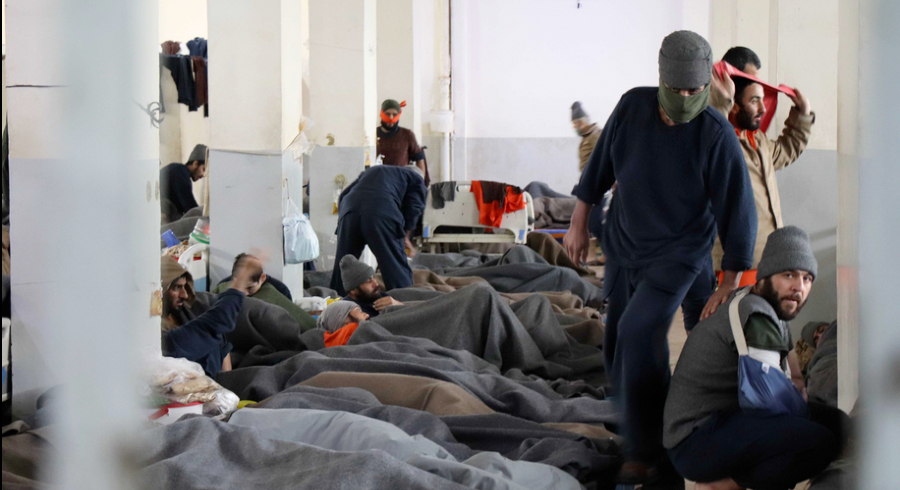Lessons for Reintegrating Islamic State Detainees
Best practices drawn from three decades of research on disarmament, demobilization and reintegration.

Published by The Lawfare Institute
in Cooperation With

Editor’s Note: Thousands of individuals suspected of belonging to the Islamic State remain in detention camps with no prospect of either release or a trial in sight. New York University’s Mary Beth Altier examines this challenge, drawing on lessons from the reintegration of other former combatants. She warns that indefinite detention can worsen reintegration problems and spells out the conditions that make successful reintegration more likely.
Daniel Byman
***
It has been three years since the Islamic State’s self-proclaimed caliphate was wiped off the global map. Yet, thousands of Islamic State fighters and tens of thousands of the group’s adherents, including a large number of women and children, remain detained in inhumane and insecure conditions in Syria and Iraq. In Syria, the al-Hol camp alone is estimated to contain 65,000 individuals, including more than 10,000 foreigners representing roughly 60 different nationalities.
Although the Islamic State is relatively new on the global scene, the international community has more than 30 years of experience in the reintegration of insurgents and civilians who lived under their control through formal disarmament, demobilization and reintegration (DDR) programs. The problems presented by the caliphate’s collapse are not entirely new. Many participants in DDR initiatives were violent extremists, and some insurgent groups like the Islamic State were defeated through military victory. In a forthcoming report for the United States Institute of Peace highlighted in the recent RESOLVE Forum, I review more than 300 articles, reports, and books on DDR and summarize their implications. This literature presents clear lessons for managing the postconflict situation in Syria and Iraq.
The Impact of Indefinite Detention
One important lesson is that holding individuals for long periods of time or in inhumane conditions contributes to low self-esteem, insecurity, mistrust, resentment, and hopelessness, all of which breed a discourse of resistance against the state or one’s captors and are associated with reinvolvement in an armed group. While many observers might assume that individuals in detention camps in Syria and Iraq are already committed Islamic State supporters, this is likely not the case. Locals confronted a dire choice between certain death or supporting the Islamic State as the group rolled through Iraq and Syria. Others may have joined not because they believed in the group’s ideology, but for opportunistic reasons, including financial gain or the social bonds or sense of adventure the organization offered. A number, too, are likely deeply disillusioned with their involvement in the Islamic State and want to leave but are unable to deviate from adhering to the group’s ideology given the poor security conditions in the camps and outright intimidation from more committed extremists. For all of these individuals, indefinite and inhumane detention may have a radicalizing effect and increase the likelihood they return to or turn to violence.
A second valuable lesson is that the longer Islamic State fighters and supporters are detained, the more likely they are to be stigmatized by the communities on which their reintegration depends. Research shows that their extended isolation from the community fuels public fear and suspicion. Stigmatization, in turn, reinforces returnees’ deviant status and contributes to deviant behavior. It impedes their ability to find work and establish a sustainable livelihood outside of violent extremism. Stigmatization further precludes the development of a social network outside the violent group or radical milieu. This is important because these new social ties, whether in the community or through work or education, aid in the development of a new identity, separate from one’s involvement in or support for violent extremism. Both are fundamental in promoting one’s disengagement from violence and eventually, over time, deradicalization.
Third, research shows that prolonged detention makes it more difficult for violent extremists to envision an alternative life for themselves. We typically think of violent extremists and their supporters as deeply committed, but research shows that some are deeply dissatisfied with aspects of their involvement and are searching for a way out. Many remain because they cannot imagine a pathway out of violent extremism or a different, viable life for themselves. They have few alternatives and high sunk costs. In interviews I have conducted with terrorists representing a range of ideologies, a sizable number indicated they spent months, often years, disillusioned and looking for a way to leave violence and their group behind.
A final consequence of indefinite detention not captured by the DDR literature but worth mentioning is that the unwillingness of countries to repatriate and reintegrate those who traveled to join the Islamic State may play into the group’s ideology and feed radicalization and recruitment efforts abroad. I have seen firsthand Islamist activists in the West proselytize that the failure to repatriate former Islamic State members, especially children, is evidence that the state discriminates against Muslims and does not consider them “British,” “French” or “Belgian.”
Reintegration Into What?
The reintegration of these individuals is not an easy or well-understood task. This is likely why some members of the international community have washed their hands of them. Much of the existing discourse and research on violent extremist disengagement centers around individual risk factors and risk assessment. Yet research on DDR indicates that the successful reintegration of these individuals will depend just as much on societal factors as individual ones. In Syria and Iraq, the political and economic conditions are far from ideal.
Successful reintegration requires a certain level of economic development and postconflict stability. When the labor market is poor or disrupted regularly by conflict, individuals are not able to obtain a sustainable livelihood outside of violent extremism. According to the World Bank, Syria ranks among the poorest countries, while Iraq fares much better and is classified as an “upper-middle-income” economy. Syria and Iraq, though, still suffer some of the highest levels of terrorist and insurgent violence anywhere, which has a severe impact on the local labor market. Businesses and investors flee and individuals may fear traveling for work, severely constricting employment opportunities. Individuals’ economic reintegration may also be impeded, even in developed democracies, by discrimination in the job market or security measures—such as restrictions on their movement or use of the internet—that limit the types of employment they may pursue.
Possibly more important than economic factors, successful reintegration requires a certain level of security, mutual trust and political will in society. Individuals are likely to take up arms or support armed groups if they feel in danger or where the state lacks territorial control. Draconian state policies, exclusionary politics, and the absence of confidence-building measures also impede disengagement and foment the initial grievances that may have led to involvement in violent extremism. A quick glance at Syria and Iraq reveals that the political and societal conditions for disengagement and reintegration are not ripe. Many of the grievances that contributed to the rise of the Islamic State and other armed groups, such as Hayat Tahrir al-Sham, are still present. Syrian president Bashar al-Assad, who repeatedly deployed chemical weapons and engaged in other egregious war crimes on his own people, is still in power. In Syria and Iraq, intercommunal tensions are rife, and corruption and insecurity run rampant. While the Islamic State’s military defeat is likely to subdue violence and promote disengagement in the short term, the likelihood of conflict escalation and reengagement is high in the long term.
Developed democracies, too, must confront a number of societal challenges. Rather than focusing solely on the risk assessment of individual returnees, these states must pay greater attention to the economic, social and political marginalization of entire communities. Reintegration is often a misnomer, as some individuals were never economically, socially or politically integrated to begin with. Once home, returnees, including children, are often stigmatized, adding to their trauma. The use of securitizing language by governments or nongovernmental organizations also makes it more difficult for returnees to view themselves as something other than “violent extremists” or to establish new identities within society. Such language also inhibits community acceptance.
Moving Forward
The reintegration of those associated with the Islamic State may seem like a tall order given the societal barriers, especially in Syria and Iraq. However, three decades of experience with DDR offers some potential ways forward to help promote disengagement and reintegration even in the most adverse political and economic conditions. First, any time in prison or detention should contribute to one’s reintegration by helping individuals realize the possibility of a different future for themselves. Right now, these moments, at least in the detention camps, seem to be wasted at best and may be fueling grievances and enacting roadblocks. Research shows that, after release, familial and civil society networks may help returnees transcend stigma. Public sensitization measures that highlight the importance of reintegration and educate communities (for example, on the victimhood of children, or on the coerced involvement of members) can also help foster acceptance. Finally, well-designed and locally developed participatory projects that address a common communal need may hold great promise. Unlike other programming that benefits only the perpetrators of violence, community-based projects embody a commitment to a shared future, highlight the incredible social capital and skills that returnees often wield, and serve as a form of reparations. Participation helps reintegrating fighters and their supporters develop new relationships and a positive identity within society. Such projects also generate additional social capital and resilience, which serve as important protective factors against radicalization and recruitment.
Perhaps the most important lesson from the DDR literature, however, is that these short-term projects and measures to foster disengagement and reintegration are likely to have limited effects when they are divorced from larger political, economic and social reforms. They may help on the margins, but they are a Band-Aid approach to greater systemic problems that shape individuals’ attitudes and incentives to take up arms. It is unrealistic to expect that citizens will remain disengaged over the long term when they fear greatly for their lives, the state or other groups engage in grave human rights abuses and are not held accountable, or a sustainable livelihood outside of violent extremism is simply not possible. Establishing a baseline level of security, mutual trust, and political will, in addition to economic opportunity in a society, is not an easy or rapid task. It often requires conflict termination, a negotiated settlement that includes all parties, security sector and judicial reform, the overhaul of political institutions, and greater government transparency and accountability. Although this is no easy endeavor, any serious attempt to promote the sustained disengagement and reintegration of violent extremists must realize the need to advance these aims.
Prioritizing reintegration does not mean absolving individuals associated with the Islamic State of the crimes they have committed. Individuals should be justly prosecuted, and key security measures will remain necessary. However, one day, a significant number of these individuals will be released, and for others, sufficient evidence for prosecution is lacking. Planning for their reintegration is an urgent need; failing at this means that policymakers will forever have to be reactive in the fight against violent extremism.





